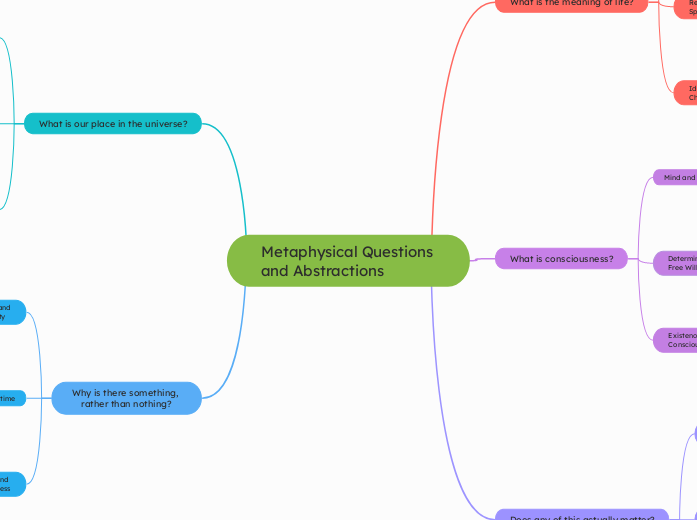Metaphysical Questions and Abstractions
What is the meaning of life?
Existence and
Consciousness
Thomas Nagel
The Theory of Subjective Experience
Nagel states that consciousness and
subjective experience cannot be explained
by physics. This means that no one will be
able to connect ones experience to another
because of subjectiveness. (Brody, R. 2013, July 16).
No one persons life is the same, therefore
there is no one answer to this question.
Religion and
Spirituality
Kierkegaard
The Theory of Self
Kierkegaard claims that a meaningful life
is achieved through finding ones self through
non-linear thinking. (Lippitt, J., & Evans, C. S. 2023, May 22)
A person reaches true self meaning when
they have found themselves as a whole.
Identity and
Change
Leibniz
The Theory of the Good
Leibniz's first part of his theory states that
goodness is achieved by simply existing. (Youpa, A. 2024, September 5)
Goodness is meaningful to people with
goodness in their heart.
What is consciousness?
Mind and Matter
Descartes
The Theory of Innate Knowledge
This theory is the idea that we are born
with knowledge. Descartes states that one
is born with crucial knowledge that God has
given us. (Internet encyclopedia of philosophy)
Innate knowledge or natural instinct are
ideas that cannot be created because they
just are.
Determinism and
Free Will
Spinoza
The Theory of Nature
Spinoza claims that a human being
is merely a projection of God's thoughts. (Nadler, S. 2023, November 8)
There is no way to know what is our own choosing.
Existence and
Consciousness
Thomas Nagel
The Theory of Electrical Firings
Nagel's theory says that the only reason one
is conscious, is from your brains activity. He
says it is simply as real as your brain itself. (Brody, R. 2013, July 16)
EEG machines presenting brain waves proves
that there is some form of consciousness or
function.
Does any of this actually matter?
Necessity and
Possibility
David Lewis
The Theory of Modal Realism
The use of language can change the
meaning of anything, especially if no one
is around to disprove the statement. (Internet encyclopedia of philosophy)
History is only possible through statements of people that were there when something happened.
No one will know what of it is the truth, and what
matters.
Identity and
Change
Leibniz
The Theory of the Good
Leibniz's secondary topic of this theory
is that goodness is achieved through the
development of ones life. (Youpa, A. 2024, September 5)
The older one is, the more they know, therefore
the things one is doing now will matter in the
future.
Religion and
Spirituality
Kierkegaard
The Theory of Passions
This theory explains that it is personal
achievements that shape a human life. (Lippitt, J., & Evans, C. S. 2023, May 22)
One is defined by their actions. The more
actions one makes, the more meaning they
put into their life.
What is our place in the universe?
Abstract Objects
and Mathematics
Plato
The Theory of Forms
One cannot draw a triangle because it
is a perfect object. Humans cannot fully
understand and replicate these perfect
forms. (Philosophy Now)
The universe is too perfect for human
understanding, therefore we have no
place in changing it.
Cosmology and
Cosmogony
Voltaire Plotinus
The Theory of his Highest Principle
Plotinus believes that there is a higher
being within the cosmos. It is self sufficient,
and much more powerful than humanity. (Internet encyclopedia of philosophy )
There can never be proof of such
a thing. However, it would be wise to
keep way from the jeopardy of peace
if one were to look for it.
Space and Time
Albert Einstein
The Theory of Individuality
Einstein proposes that one cannot calculate
an electrical charge in ones body, however, one can observe similarities (patterns) of those
charges within the universe. (Howard, D. A., & Giovanelli, M. 2025, February 2).
Patterns connect everything, humanity
is a part of those patterns. To ruin them
would be to ruin the universe.
Why is there something,
rather than nothing?
Religion and
Spirituality
Kierkegaard
The Theory of Existentialism
This theory states that a human cannot
classify another human as "real" because
they themselves are potentially not "real". (Lippitt, J., & Evans, C. S. 2023, May 22).
You cannot use the word in it's definition,
therefore one can never know if there is
actually something.
Space and time
Albert Einstein
The Theory of Reality
Einstein claims that even if we classify
something as "real", that does not make
it certain. (Howard, D. A., & Giovanelli, M. 2025, February 2).
No one knows what is real.
Existence and
Consciousness
Thomas Nagel
The Theory of Mind and Cosmos
This theory's purpose is to connect the state
of mind consciousness and the external
cosmos. Nagel wishes to improve science
and prove a relationship between personal
existence and the universe. (Brody, R. 2013, July 16).
Existence is coincidental, and nothing can
be known for certain.
